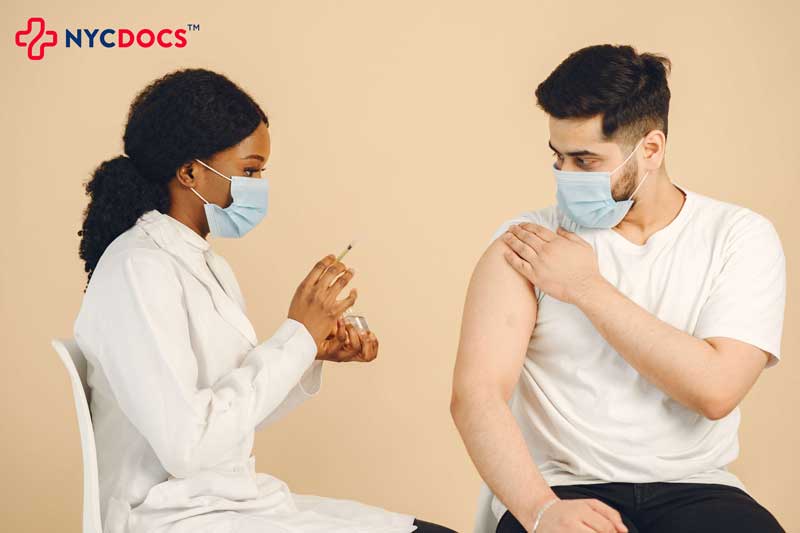Flu Vaccines and Flu Shots to lessen life-threatening conditions and the severity of the diseases

Flu is the short form of Influenza. It is a contagious inhaling disease caused by a virus called influenza virus. Flu vaccines and flu shots are produced to provide a defensive barrier against flu viruses and reduce the acuteness of the illness.
What is Influenza?
Influenza is an infectious inhaling disease caused by Influenza viruses. It is commonly known as the flu. These viruses affect the nose, throat, and often the lungs, causing an array of symptoms varying from mild to severe. At times, in case of high-risk groups such as the infants and the elderly, flu can be life-threatening.
Causes of Influenza:
- Virus types: There are mainly four types of influenza viruses –A, influenza viruses-B, influenza viruses-C, and influenza viruses-D. Types A and B cause seasonal flus. Influenza A virus is categorized into subtypes depending on their surface proteins –hemagglutinin (H) and neuraminidase (N).
- Viral Strains: Influenza Viruses can often be mutated and change with time, causing the appearance of new strains. This continuous evolution is why flu vaccines and flu shots are annually administered, to give protection against the most dominant strain.
Symptoms of Influenza:
- Fever
- Sore throat
- Runny nose
- Stuffy nose
- Shortness of breath
- Cough
- Headache
- Body aches
- Fatigue
- Nausea
- Vomiting and Diarrhea (in kids only)
Influenza Transmission:
Influenza virus is contagious. It spreads principally through respiratory droplets when infected people sneeze, cough or simply talk. It can also spread if you come in contact with an infected surface and touch your mouth, nose or eyes. People who are infected with Influenza can spread the virus even before they know their own symptoms (one day before symptoms appear) and up to 5-7 days after becoming sick. But flu vaccines and flu shots help prevent this transmission.
Prevention and Treatment:
Vaccination: Flu vaccines and flu shots help develop antibodies against specific variants of the flu viruses. This is why it is recommended to get vaccinated annually.
Antiviral Medications: Apart from flu vaccines and flu shots for prevention, antiviral drugs are prescribed to treat the flu, especially to people who are at risk of complications or show severe symptoms. So, This can reduce the severity and duration of the illness if taken on time.
Complications: Certain age groups for example young kids –infants and toddlers, senior citizens, pregnant women, and people with chronic medical conditions like asthma or heart problem issues are at a higher risk of developing severe diseases from the flu. These include pneumonia, sinus infections, bronchitis, and worsening of already existing conditions. But flu vaccines and flu shots help prevent further complications.
Difference between flu vaccines and flu shots
Flu vaccines and flu shots are related terms but they refer to different methods of conducting the influenza vaccine. Flu vaccines are the substance that stimulates our immune system to produce an immune response, defending against influenza viruses. It comes in various forms such as injections, nasal sprays, oral solutions etc. and types to protect against the flu.
Flu shots are a method of injecting the flu vaccine into the muscle, preferably in the upper arm. The flu shot contains inactivated influenza viruses. Flu shots are the most common way of receiving flu vaccines.
Aside from the flu shots, there are more ways to receive flu vaccines–
Nasal Spray (Live Attenuated Influenza Vaccine - LAIV): This is a flu vaccine that is conducted via the sinus. It is made with weakened live viruses and is applicable for healthy, non-pregnant people aging between 2 to 49 years.
Recombinant Influenza Vaccine: This is made using genetic engineering and does not need to use a flu virus. It is another form of vaccine available as injections.
How do flu vaccines and flu shots work?
Two weeks after the vaccination, antibodies will be developed and will provide protection against infectious viruses that are used to create the vaccine.
Seasonal flu vaccines protect us from the most common influenza viruses. Most of the flu vaccines in the US give us protection against four different flu viruses (quadrivalent) –an influenza A (H1N1) virus, an influenza A (H3N2) virus, and two influenza B viruses. There are also some flu vaccines that protect from three viruses (trivalent) –an influenza A (H1N1) virus, an influenza A (H3N2) virus, and one influenza B virus. Two of the trivalent vaccines are designed specially for people 65 and older in order to create a firm immune response.
Types of Flu Vaccines
Below is a comprehensive guide on the types of flu vaccines and flu shots you can get–
Inactivated Influenza Vaccine (IIV)
Inactivated Influenza Vaccine are of three types–
- Standard flu shots: These carry dead or inactivated flu virus and are injected to muscles normally. Standard flu shots are the most common type given to people.
- Adjuvanted Vaccine: These contain an added adjuvant to help boost the immune response for senior citizens.
- High Dose Vaccine: This vaccine is for people who are 65 and older to help them produce a stronger immune response.
Live Attenuated Influenza Vaccine (LAIV)
This vaccine is known as nasal spray vaccine as it is sprayed into the nostrils. This alternative to flu shot is useful for healthy, non-pregnant people between 2 and 49 years old.
Recombinant Influenza Vaccine (RIV)
Recombinant Influenza Vaccine does not contain the actual flu virus in its production. It is made using genetic engineering techniques. This does not contain any egg parts either.
Quadrivalent and Trivalent Vaccine
- Quadrivalent Vaccine: This vaccine protects from four types of flu virus, thus the name. These include two Influenza A strains and two influenza B strains.
- Trivalent Vaccine: Trivalent Vaccine protects against three types of flu viruses –two influenza A strains and one influenza B strain.
Cell-based Flu Vaccine:
Cell-based vaccines are manufactured with animal cells for virus propagation and thus offer an alternative production method.
Egg-free Flu Vaccine:
These vaccines are produced without the presence of chicken eggs or any eggs specially for the people with egg allergies.
Intradermal Vaccine:
Intradermal vaccines are injected with a smaller needle into the skin instead of the muscle. This is an option for people aging between 18 and 64.
Aside from the aforementioned ones, there are also age specific vaccines produced for age groups such as children, or elderly for effectiveness. Moreover, health conditions of people, or seasonal availability play a part in developing vaccines. It is advised to always consult a doctor or healthcare provider to choose a vaccine depending on your age and health conditions.
Who should be vaccinated?
As pre the Centers for Disease Control and Prevention (CDC), the annual flu vaccination should be administered for everyone who are at least 6 months of age and older, especially the ones who are at high risk:
- Young kids
- Elderly people
- Pregnant women
- People with chronic health conditions
- Caregivers of people at high risk
- Healthcare providers
Flu Vaccination Benefits:
Flu vaccination in any form has multiple benefits:
- Illness prevention
Flu vaccines effectively prevent Influenza in people. If someone is vaccinated and still comes in contact with the virus, the severity of their symptoms, and the duration of the illness will be reduced.
- Protection of endangered people
Certain age groups for example infants, elderly citizens, pregnant individuals, people with sinusitis and similar diseases are at risk of coming in contact with the virus. Getting vaccines reduces the chances of getting the disease for these vulnerable people.
- Decrease in hospitalization and fatalities
Getting flu vaccines help reduce flu-related deaths among vulnerable individuals. Also, the number of hospital visits, emergencies, doctor appointments etc are lowered.
- Public health benefits
People with weakened immune systems cannot get flu vaccines and flu shots. If most people in a community are vaccinated, the disease does not spread. It helps protect the vulnerable groups. This is called herd immunity.
- Contribution to overall health
Protection from flu contributes to maintaining overall health as flu-related health issues hamper with being active and productive.
- Cost effective
Flu-related illness causes a rise in medical expenses. Getting vaccinated helps with living with a better economy as flu meds are hardly needed.
- Safe and secure
Flu vaccines and flu shots have little to no side effects including mild fever, soreness or redness around the injection site etc.
- Annual strain adaptation
Flu vaccines need updates every year to match with the current variants. These adaptations ensure protection against the most prevalent circulating flu strains.
Duration and Effectiveness
The protection of flu vaccines starts about two weeks after vaccination and remains for several months. The effectiveness however varies depending on factors like the similarity between vaccine strains and circulating viruses.
Reactions and Side Effects:
Most people who get the flu vaccines and flu shots do not get any severe reactions or side effects. However they can experience:
- Aching in the body
- Low-grade fever
- Nausea
- Fatigue
- Redness, soreness or swelling at the injection site
Why do I need a flu vaccine every year?
Flu viruses evolve and to match the circulating strains, the vaccine is updated every year. This is why you need a flu shot, or flu vaccine every year.
Myths about the flu vaccines and flu shots:
There is a stigma around flu vaccines and flu shots. People always question its genuinity and effectiveness.
- Influenza is not a serious disease and I do not need the vaccine.
People can die every year of respiratory diseases. So the impact of Influenza is higher than we can imagine. Most people will recover within two to three weeks but some may develop pneumonia, ear and sinus infections, heart or lungs inflammation etc.
- Does the flu vaccine give you the flu?
No, the flu vaccine does not contain live viruses and therefore will not give you the flu.
- Flu vaccines will cause severe side effects.
Most people never get any serious side effects. Minor side-effects include soreness, redness around the injection area, mild fever etc. One in a million people may get Guillain-Barré Syndrome (GBS) that causes muscle weakness and paralysis.
- I had the vaccine and still got the flu so it is ineffective.
Since there are several flu viruses spreading simultaneously. So if you are protected from one virus, you might get infected from others. Still flu vaccines and flu shots improve your chances in preventing the encounter with flu viruses by providing partial protection. This also helps building a healthier immune system in a community.
- I am pregnant so I should not get the flu vaccine.
The immune system is weaker during pregnancy. Flu vaccines and flu shots are safe for pregnant people.
Compositions of flu shots:
Traditional flu shots contain dead or inactivated influenza viruses that cannot cause the flu but help our immune system set up a defense against it and this helps us fight the disease if we get it later. Some flu shots have only specific proteins from the virus rather than the whole virus, such as hemagglutinin and neuraminidase.
Administration of Flu shots:
The administration of flu shots depends on age, health conditions, and vaccine availability. However, flu shots are given annually during flu seasons which are the autumn and winter months in the northern hemisphere.
Flu vaccines and flu shots are pivotal tools in prevention of Influenza, reducing its severity, and minimizing the health impacts on public health. It is wise to consult your healthcare providers for getting flu vaccines and flu shots depending on your age and health conditions.
Is COVID-19 a flu?
Even though both are respiratory diseases and share similar symptoms, Influenza and COVID-19 are caused by different viruses and thus are two different diseases. COVID-19 is caused by the novel coronavirus SARS-CoV-2 that was discovered in late 2019. Coronavirus family is different from flu virus family. Both diseases have symptoms like shortness of breath, cough, fever etc. but COVID-19 makes you lose your sense of taste and smell, give you gastrointestinal issues, and often more complicated problems such as lungs dysfunction. Both viruses spread through respiratory droplets but the COVID delta and omicron variant are more serious as infectious diseases. Compared to Influenza, COVID has caused more hospitalizations, long lasting lung issues, and even more deaths. Unlike annual flu vaccines and flu shots, several vaccines for COVID have been developed and there are antiviral medications used to treat severe cases.










